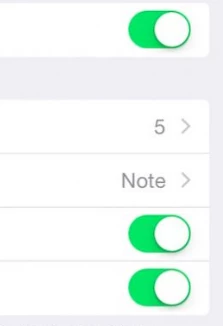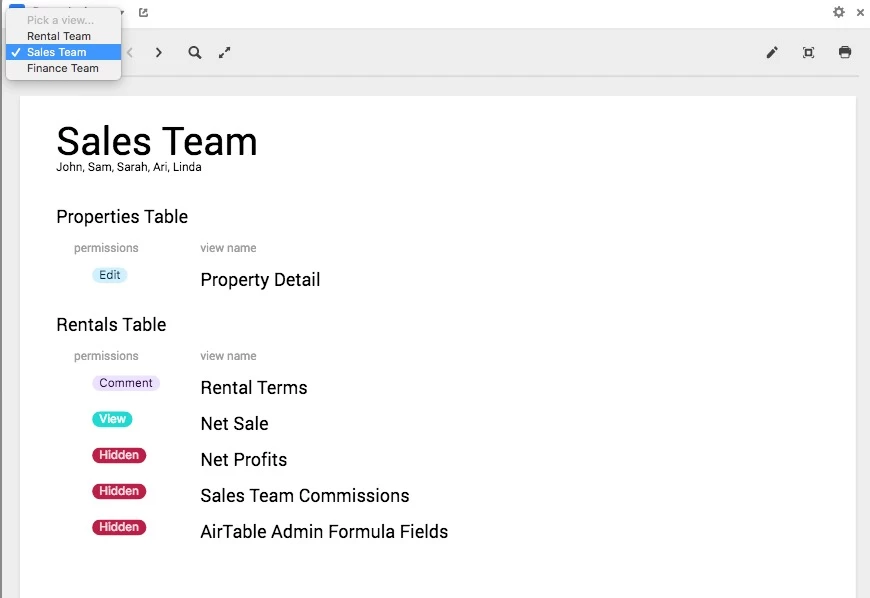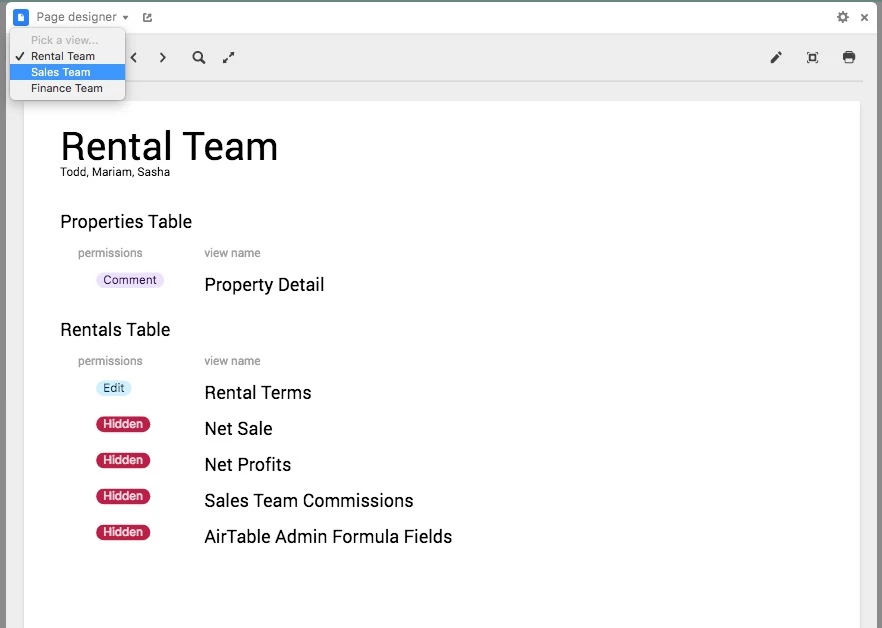Again running into issues with not having more granular control of User Permissions. Wondering if this is on the Roadmap and if so (Though I know you can’t say when) is it one of the higher priority items?
You all are awesome. Thanks!
 +4
+4Again running into issues with not having more granular control of User Permissions. Wondering if this is on the Roadmap and if so (Though I know you can’t say when) is it one of the higher priority items?
You all are awesome. Thanks!
 +4
+4You’ve created a great product. This is the biggest road block I can see which is a matter of data security.
We’re looking for collaborator level permissions so you can set views for specific collaborators. E.g. I create the Howie view, and only you can see, edit, modify the data in that view.
A workaround could have been to use web views but these are read only.
The case study here is an organisation with all their order data in Airtable.
Different teams work on different parts of the order (like an assembly line). Each team only needs to see their view and data they need to input to help complete the order. They don’t want or need access to the entire base with all the views. This seems to me like it would be a common requirement when thinking about how organisations work in teams with shared data.
A simpler feature request is - expand on the ability to share a web view and allow users to share a grid view. In the same way as Dropbox allows you to share a folder, anyone with the link can edit.
Giving my +1 for this feature. My use case is:
I want to display some records in the Gallery view to 5 of my clients. There is a separate gallery view for each of my client. Now, ideally I’d want
There’s another, simpler way of looking at this: I want my client to be able to edit a view which looks identical to a read-only table view (as in, they won’t be able to see hidden columns or other tables/views), but the client can comment on it or change a specific field of my choosing.
The solutions mentioned above by other users are all great, such as view-visibility, column-locking and another access level between “Editor” and “Commenter”. Also, as Google is able to implement such granular editing for Google Docs/Sheets/Slides, and is widely used by lots of people, I don’t buy the reason that adding such levels will “confuse” Airtable’s existing users. Also, I also don’t think Airtable needs to satisfy all needs with user-level permissions, just the majority of them.
Really looking forward to this feature, as it will open up lots of collaboration opportunities with outside vendors/clients.
 +4
+4Giving my +1 for this feature. My use case is:
I want to display some records in the Gallery view to 5 of my clients. There is a separate gallery view for each of my client. Now, ideally I’d want
There’s another, simpler way of looking at this: I want my client to be able to edit a view which looks identical to a read-only table view (as in, they won’t be able to see hidden columns or other tables/views), but the client can comment on it or change a specific field of my choosing.
The solutions mentioned above by other users are all great, such as view-visibility, column-locking and another access level between “Editor” and “Commenter”. Also, as Google is able to implement such granular editing for Google Docs/Sheets/Slides, and is widely used by lots of people, I don’t buy the reason that adding such levels will “confuse” Airtable’s existing users. Also, I also don’t think Airtable needs to satisfy all needs with user-level permissions, just the majority of them.
Really looking forward to this feature, as it will open up lots of collaboration opportunities with outside vendors/clients.
Totally agree. Google Docs is a great example of how users expect this level of control which is why it is so surprising that AirTable doesn’t have it. The nature of work has changed, teams are distributed, freelance and agile. User level permissions are the way we manage security, complexity and the general experience.
Come on guys, let’s make this the next What’s New!
@Katherine_Duh would be great if you guys could give us any update regarding this. Is it being worked on, or is it something you’re not focusing at the moment, anything :slightly_smiling_face:
 +4
+4Actually it would be great to know what you guys are working on in general? There’s been a flurry of activity up until June :slightly_smiling_face:
Yes, this is a barrier for us adopting Airtable more broadly. Would love to know where this is on the roadmap.
+1
I have been trying to push towards team wide adoption of airtable, but this is the biggest blocker to get buy in from executives
Huh, don’t think they’ll continue to read this thread by now BUT, I also agree with the other users here. Understanding you want to keep Airtable simple (and that is great), a SIMPLE way to add advanced user permissions could be:

 +3
+3Requests for more granular access permissions have been beaten to death, but I recently shared this detailed use case/request with a member of Airtable support, so I’d like to post it here, as well – both for reference and to learn whether or not the community has discovered workarounds.
USE CASE
As a short-term vacation rental company, our primary AirTable Base stores the following types of data:
PROPERTIES (Table 1)
RENTALS (Table 2)
As for our company structure, we’re made up of multiple departments (like most companies). Each department demands specific levels of access to certain types of data (also, like most companies). For example, here are 2 departments and the level of access they each require to the data types listed above:
SALES TEAM
RENTAL TEAM
PROBLEM
You may notice a similarity between the needs of the Sales Team and Rental Team: both sets of users require at least 2 permission types for data stored within the same Table. The current Airtable permission settings do not allow us to mimic this access structure.
We need granular access permission sets that can be applied “per user, per view”, as opposed to the current “per user, per base”. We’re not so much interested in restricting access to the records of our base, but more interested in restricting access to the columns/fields, and limiting which users can read and/or edit the content within these fields. It’s not enough to blanket each staff member with the binary option of “READ Everything inside the Base” or “EDIT Everything inside the Base”. There are too many nuances in between.
At the same time, “per user, per view” permissions are complicated to maintain, and perhaps too granular. Which leads me to my proposed compromise…
PATHS TO A SOLUTION
Certainly this is far easier said than done, but the most holistic, usable, and obvious solution (imo) would result from the addition of:
TEAMS
TEAM VIEWS
TEAM ADMIN PANEL
To illustrate, here’s a very crude rendering of the Team Admin Panel:


ADDITIONAL CONSIDERATIONS
Since Views are merely groupings of “Fields”, these additions would ultimately allow a clever Base Creator to assign granular permissions on a “per user, per field” level, if they so choose.
Consider a single user, John, who has the following access:
These permissions are better thought of like so:
Since John’s highest level of access is EDIT, he can add new Personal or Team View to the Base. If John were to create View C, he would have all Fields of View A and View B at his disposal in creating his new View C, but his ability to EDIT field data will be limited to the Fields of View B.
+1
I’m an advocate of Airtable for app prototyping; more advanced user permissions would represent a big step towards more heavyweight prototypes.
Actually it would be great to know what you guys are working on in general? There’s been a flurry of activity up until June :slightly_smiling_face:
Agreed! Even just at a high level - what’s on the roadmap.
effectively handed a well-developed feature idea on a silver platter. Pretty please team Airtable! I second this feature 100%. :pray: :pray: :pray: This is especially useful for teams collaborating with external contractors on project basis!
I would also like to hide some tables and views from certain users. Maybe with an option to exclude people (not breaking the current simple setup). Linked columns could be read only / non-editable or something…
Reading this I’m thinking that an option to Lock specific Columns / Rows / Cells from Changes by others may be very useful - thinking how to implement and keep it simple. And I know there have been times I put a complex formula in a column and I’d like to lock it from changes except for a few specific persons.
There’s not a one-size-fits-all solution to user permissions—all of the users who’ve asked us about greater customization in their permissioning have had their own unique workflows and use cases. The challenge for us is to design features that solve the many different types of permission granularity that people want, without adding overwhelming complexity. There are other products that offer highly detailed permissions options, but we don’t necessarily want to bring all of those levels of complexity into Airtable, as we’re generally designed for more lightweight use cases.
We would love to hear more about the specific issues that you’re having with the current permissions model, and what problems you’re trying to solve—the feedback we get from users is one of the most valuable things we can have when we’re trying to design new features to be as elegant as possible.
HI - Wanted to add in a specific use case and need where this would be a HUGE time saver for us. We work on projects with outside agencies – and I’d love to be able to use airtable to manage projects with them. However, I don’t want to share my entire base with them – just the table of deliverables that they are a part of it.
Without that, I have two choices:
To me - table level permissions is necessary for teams who work with outside agencies.
I too need this feature.
I am running a consulting shop for software implementation.
I have one master list on which I track all of our clients open items.
I have a view for each client, of their open items and would like to provide them editor access JUST TO THEIR VIEW.
Very disappointed that this is not possible today!!!
There’s not a one-size-fits-all solution to user permissions—all of the users who’ve asked us about greater customization in their permissioning have had their own unique workflows and use cases. The challenge for us is to design features that solve the many different types of permission granularity that people want, without adding overwhelming complexity. There are other products that offer highly detailed permissions options, but we don’t necessarily want to bring all of those levels of complexity into Airtable, as we’re generally designed for more lightweight use cases.
We would love to hear more about the specific issues that you’re having with the current permissions model, and what problems you’re trying to solve—the feedback we get from users is one of the most valuable things we can have when we’re trying to design new features to be as elegant as possible.
Hi Katherine, are advanced user permissions on the roadmap for 2018? I’m guessing a lot of users would love to know that (even if it’s not coming out this year). Thanks :slightly_smiling_face:
+10 for more advanced user permissions. In my case, I would like someone to make changes to the base without having access to the entire base. This is not currently possible without using workarounds like forms that are much too cumbersome.
Airtable,
Love your product, but the lack of user permissioning in Airtable is holding back both a) the companies that use your product and b) the growth of your company.
While you think of yourselves as a new-breed “collaboration tool”, it is clear from comments in this thread that many companies are trying to use your product as an SAP-like enterprise management tool (ERP).
Airtable enables companies to easily create and manipulate very stripped down cross-linked databases (without all of the baggage and cost of traditional ERP tools like like SAP) and immediately publish the data for distributed availability and use, including on mobile devices – all without any required specialized knowledge other than basic spreadsheet skills. That is super powerful and does not exist elsewhere!
However, without better user permissioning, companies using Airtable are unwilling to use it broadly and invite more (paying) users into the database because there is no way to allow users to view/edit data without granting access to view/edit the entire database.
You are missing a massive opportunity here. Look at capterra.com and all the software out there that has been created for specific end-markets (here is the list of just the categories of software: http://www.capterra.com/categories). Airtable could be used for just about all of those categories.
By contrast to software developed for specific end-markets, a product like Airtable is 100% flexible so companies can set up their data and processes exactly as they want them and they can manage data and processes across the entire enterprise with just one database – essentially companies can create and easily roll out their own custom enterprise software.
Your target market is enormous and you have the opportunity to be the first mover. But I’m afraid if you don’t address users’ needs re: permissioning, somebody else will come along and build a similar product that does.
This is so true. Really hoping Airtable gives us a roadmap on this feature
 +4
+4So here’s the good news - I heard from AT support this month:
“Advanced permissions is something we have been working towards but as you can imagine it is something that we want to have 100% right from the get go. We know this has been a feature users have wanted for a long time and we want it too! There is, however, a lot of background work that is done to pave the way that isn’t visible to the end user. Rest assured that we find this feature as important as you do.”
:partying_face:
Would be nice if Airtable exposed it’s roadmap in a public table in Kanban view :slightly_smiling_face:
 +4
+4Would be nice if Airtable exposed it’s roadmap in a public table in Kanban view :slightly_smiling_face:
Does this help? What's new - Airtable
Does this help? What's new - Airtable
The What’s New is a good list for new features, but he’s probably looking for something like this:
+1 Looking to restrict Collaborator Acces to tables
Enter your E-mail address. We'll send you an e-mail with instructions to reset your password.
Sorry, we're still checking this file's contents to make sure it's safe to download. Please try again in a few minutes.
OKSorry, our virus scanner detected that this file isn't safe to download.
OK